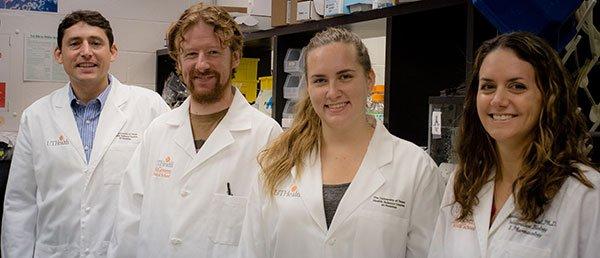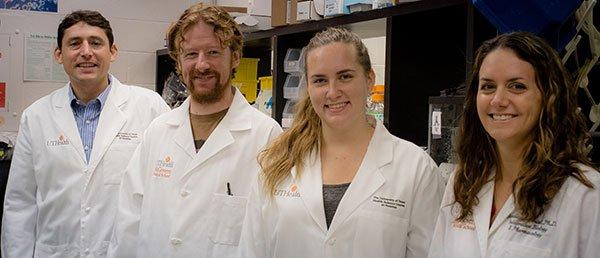
Credit: Maricruz Kwon, UTHealth
You are what you eat when it comes to fat, report scientists from McGovern Medical School at The University of Texas Health Science Center at Houston (UTHealth) in the journal Science Advances.
Dietary fats are converted into lipids, which make up the membranes that surround all living cells.
The type of fat a person consumes may determine whether stem cells are converted into bone cells or fat cells, said Ilya Levental, Ph.D., the study's senior author and assistant professor of integrative biology and pharmacology at McGovern Medical School at UTHealth.
"The fats that we consume such as cholesterol, unsaturated fats and fish oil become robustly incorporated into the membranes of our cells and dramatically change the composition and function of those membranes," said Levental, a Cancer Prevention & Research Institute of Texas (CPRIT) Scholar.
To test their theory, Kandice Levental, Ph.D., the study's lead author and assistant professor of integrative biology and pharmacology at McGovern Medical School, measured the lipid content of mesenchymal (connective tissue) stem cells as they transformed into bone cells or fat cells.
The Leventals found that bone cell membranes had unique compositions, being particularly high in a type of dietary fat, omega-3 polyunsaturated fat. This fat is also called DHA and is the most abundant component of fish oil, a common dietary supplement. Most importantly, they found that adding such fish oil fats to mesenchymal stem cells pushed them to transform into osteoblasts (bone-forming cells) as opposed to adipocytes (fat-storing cells).
This fundamental research helps explain why fish oil might benefit people with osteoporosis, a bone weakening disorder. More broadly, it may provide insight into the many connections between dietary fats and a variety of clinical outcomes, including healthy aging and heart disease.
"Our investigations suggest a general mechanism by which dietary fats affect cellular physiology through remodeling of membrane lipidomes, biophysical properties and signaling," the authors wrote.
###
UTHealth coauthors included Joseph Lorent, Ph.D.; Yong Zhou, Ph.D.; CPRIT Scholar Jeffrey Chang, Ph.D.; and John F. Hancock, M.B., BChir, Ph.D. Also contributing to the paper were Michael A. Surma, Ph.D., and Christian Klose, Ph.D., of Lipotype GmbH in Dresden, Germany, and Allison D. Skinkle, an undergraduate researcher from Rice University.
The study, titled "ω-3 polyunsaturated fatty acids direct differentiation of the membrane phenotype in mesenchymal stem cells to potentiate osteogenesis," was supported by CPRIT (R1215), NIH/National Institute of General Medical Sciences (1RO1GM114282) and the Volkswagen Foundation (93091).
Chang, Hancock and Ilya Levental are on the faculty of The University of Texas MD Anderson Cancer Center UTHealth Graduate School of Biomedical Sciences. Hancock is the John S. Dunn Distinguished University Chair in Physiology and Medicine at UTHealth.
Media Contact
Rob Cahill
[email protected]
713-500-3030
http://www.uthouston.edu





